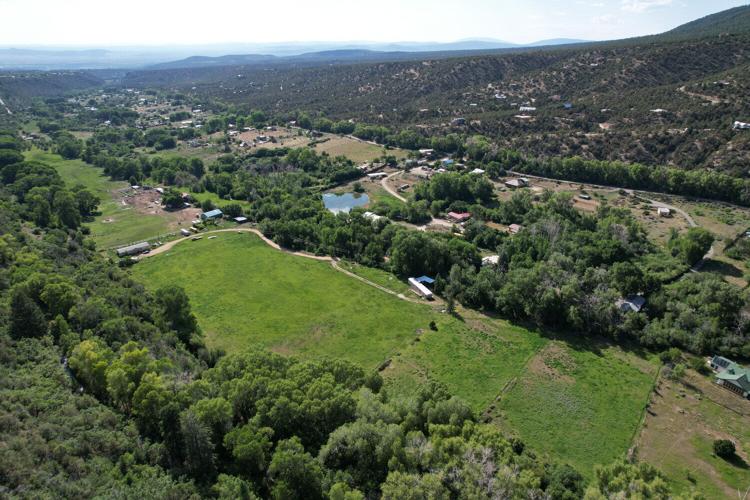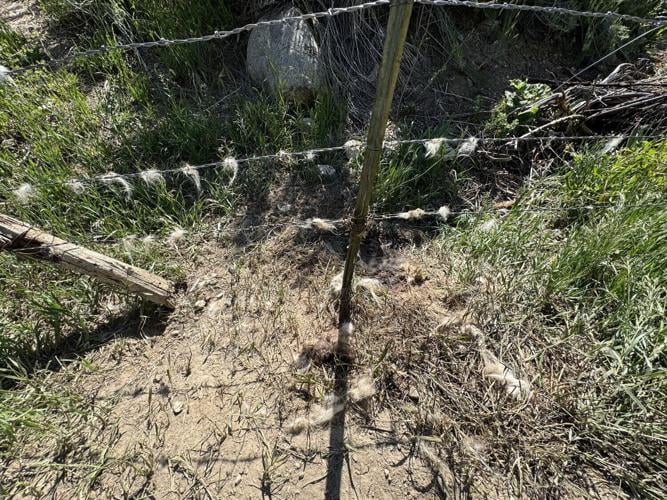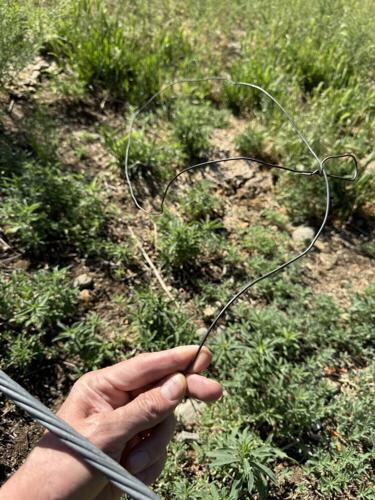 By Stephanie Gates/For the Taos News
By Stephanie Gates/For the Taos News
A Valdez couple were devastated to find their beloved husky, whom some in the area referred to as “the Mayor of Valdez,” dead in a wire trap off Broken Arrow Road in early June.
The dog, named Zuni, went missing June 3 at about 3:30 a.m. during a routine bathroom trip outside.
This time, however, she didn’t come back inside right away. The dog’s owners figured she’d been spooked by an early morning thunderstorm.
On June 5, a neighbor, Tom Garcia, found the dog dead, tangled in an unmarked wire trap and fencing, as he was driving to work.
The incident is a reminder that in rural New Mexico unleashed pets can run afoul of traps legally set on private land to protect livestock from predators. Like many parts of Taos County, Valdez is a checkerboard of non-agricultural residential properties and land that families have ranched or farmed for generations.
Conservation officers with the New Mexico Department of Game and Fish investigated the incident the same day it was reported and determined the property owner who set the trap was within his rights, according to Game and Fish regulations.
“The incident occurred on private land not owned by the owner of the dog,” said Darren Vaughan, communications director for Game and Fish. “Officers found no violations.”
Tony Valdez, co-owner of the property, said he set the traps as a deterrent, hoping dogs would learn not to come on his property, where he keeps livestock. Ranchers are wary of conflict, for example, between livestock and dogs — as well as wild predators like mountain lions and bear. In 2023, a bear killed dozens of sheep belonging to several ranchers in Arroyo Seco and El Salto.

According to the Game and Fish investigation report, the department “contacted Tony Valdez over the phone and learned that Mr. Valdez set the snares on the property for feral dogs in the area that have been attacking the cattle. This has been an ongoing issue with the feral dogs.”
“My motive is just a deterrent,” Valdez told the Taos News. “Those traps won’t kill a dog; they aren’t a true snare or a true trap. It’s a homemade bending wire deterrent. It’s possible but it’s not likely.” After learning of Zuni’s death, Valdez said he would set different traps.
The corner of Isaac Gonzalez’s property is about 10 feet from the fence line where the traps were left. Like many neighbors, he knew Zuni well.
“Unfortunately, I heard her last dying breaths,” Gonzalez said. “I didn’t know what it was, because the people at the bottom have so many animals. It sounded like a tropical bird or something. I’ve never heard anything like that. I walked towards the back, and I didn’t hear it anymore.”

When she was found, Zuni was caught so tightly in two snare traps and wire fencing that she had likely lost the ability to make any noise. One snare wrapped so fast around her hind leg it nearly reached the bone, and another around her neck appears to have strangled her. As she struggled, the wire tightened around her to a degree that her owners, Matt Gresham and Amy Zalta-Gresham, buried the dog with it.
“This feels as if we lost our baby — not to mention this could have happened to anyone’s beloved fur baby or even an unassuming child roaming in the neighborhood, as they’ve done freely in Valdez for generations,” Zalta-Gresham said.
“There are much safer traps that do not intend to kill, and we as a community would be grateful and help sponsor such traps, before it comes to the death of another member of our family,” she added. “This was cruel and inhumane.”
Neighbors who asked to remain anonymous said they removed at least seven other wire traps along the fence line. According to them, at least two other domestic dogs have been caught in snares in that spot along the pond. Both survived.
“It’s disheartening to think that it’s so close to my house,” Gonzalez said. “My dog, or another dog — or a child, or anyone — could potentially be a victim. The fact that it’s in a residential area blows my mind.”
 Proper use of traps
Proper use of traps
New Mexico’s trapping regulations are intended to limit animal cruelty; such as checking the trap every 24 hours, leaving identification on the trap, and not setting them too close to water sources. However, these rules do not apply when the trapper intends to protect livestock on private property.
To keep companion animals safe, Animal Protection New Mexico recommends working with local animal control or law enforcement officers to trap targeted species, and “utilizing a non-lethal cage trap instead, to address damage being caused by loose dogs in a humane manner.”
“Animals don’t know when they are crossing from public land to private property, and traps and snares don’t discriminate between targeted and non-targeted animals,” said Stacy Sutton Kerby, APNM chief government affairs officer. “While New Mexico has taken the correct step in banning traps, poisons, and snares on public land, APNM believes strong regulations and restrictions should apply across any piece of land where people and animals traverse. Furthermore, lethal traps and snares should never be used to capture or kill dogs.”
Game and Fish recommends residents follow the animal control ordinance regarding dogs at large (including unleashed animals) and for livestock owners to follow the laws regarding livestock protection.
‘The Mayor of Valdez’
Like many dogs in the Valdez area, Zuni was known and loved by many; neighbors called her the Mayor of Valdez. She rode on the mayordomo’s truck on ditch cleaning day and visited Sheila Rey often for a 5 p.m. bone with other dogs. Other neighbors spoke about her chatty nature.
“Zuni had been coming to my house for years,” Rey said. “She was a sweetheart, extremely vocal. She was a people person, very friendly. Loved to be hugged, loved to be petted; and she loved her little treats I would give her.
“She was just a beautiful soul,” Rey added. “She didn’t deserve to die like that.”
Zalta-Gresham hopes Zuni’s death will create change, making residential areas and the many neighborhoods with a mix of agricultural and residential properties safer for everyone.
“She was a beautiful soul in the valley of Valdez, as well as Taos Ski Valley, as her journeys brought joy to so many on a daily basis,” Zalta-Gresham said. “Her life was robbed, cut too short, but her memory has made her a martyr for change. We will do what it takes to remember her, and not let a savage act like this happen again.”
“Ordinances can and should be changed to stop poaching to kill in residential areas, for the sake of humanity and the so so many of us grieving for our Zuni girl,” Zalta-Gresham added. “She can’t be brought back but hopefully she can save lives. No unknowing pet or child deserves that fate.”
